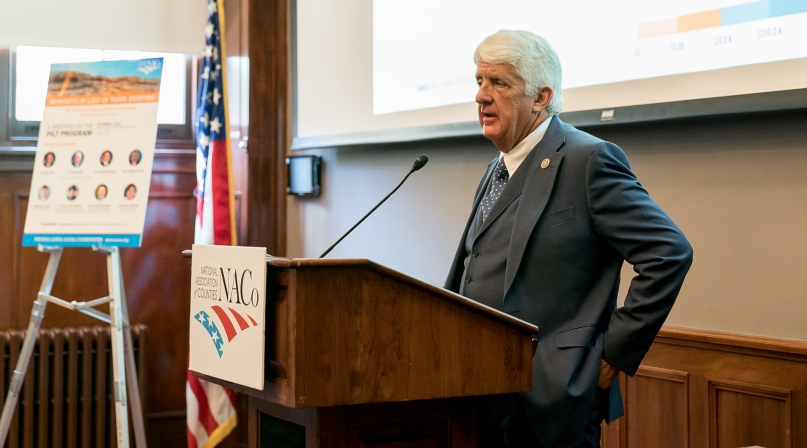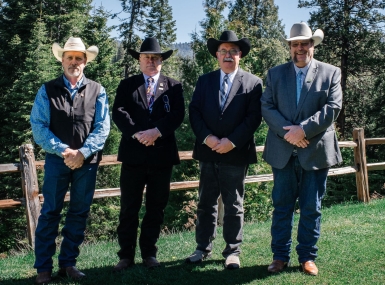Counties take PILT fight to Capitol Hill

NACo to Congress: fully fund PILT, restore SRS with two years of back funding. Nearly 60% of counties contain federally-managed land
Members of Congress from states and districts with significant amounts of federally-managed land voiced support for the Payment in Lieu of Taxes program (PILT) during a Sept. 7 Capitol Hill briefing, but they promoted more active management of forests and more local control of federally-owned land.
NACo is requesting full funding for PILT — $465 million in FY17 but likely to increase in FY18 — along with two years of back funding for the Secure Rural Schools (SRS) program, which expired in 2015. Nearly 60 percent of the nation’s counties (1,850) contain tax-exempt, federally-managed land, yet must provide essential services for their communities and to visitors to those lands on a constrict taxable land base.
“There’s just very little land to actually fund the services: EMS, pensions, schools, roads, infrastructure,” said Sen. Jeff Flake (R-Ariz.). “It’s difficult, and until the federal government does something different in regards to the ownership of land, then the federal government has to come through.”
Flake noted that the budgeting process, which has seen both Trump and Obama administrations zero out PILT funding in their budget requests, has been tough on public lands counties, which have to do their own budgeting without assurances of how much they will receive, and when.
It’s something NACo Past President Bryan Desloge can understand, despite not representing a public lands county in a Western state. Leon County, Fla., where Desloge is a commissioner, contains 24 percent public land.
“PILT may sound like pennies on the dollar, but for the counties that get it, it's life or death,” he said. “There’s no way they could operate without the PILT funding.”
Graham County, N.C. is one such county. Only 26 percent of the land in its borders is taxable, and it received $300,000 from PILT in 2016.
County Manager Becky Garland put PILT’s impact in concrete terms.
“That money can buy three ambulances, or 10 police cruisers,” she said. “It can hire six paramedics or six sheriff’s deputies. It’s vital to us to maintain essential public safety functions we are required to do. We are able to do a lot on a shoestring (budget) and PILT gives us the bow on that lace.”
Rep. Bruce Westerman, (R-Ark) was optimistic about the fate of forested counties with the Sept. 5 swearing in of new U.S. Forest Service Chief Tony Tooke and the administrative changes he would bring to the service.
“I can’t think of anything we could do that would be more beneficial to more rural counties and rural communities across the country than to start managing our National Forests in a better way,” Westerman, himself a former forester, said. “Not just to generate timber revenue that needs to be generated that goes back to the counties, but to make the forest healthier, to make them better for wildlife, air quality, water quality.”
Given the current number and variety of wildfires in National Forests Westerman said more active forest management would help the service revert to its original intent, rather than serving, as he dubbed it, as “the U.S. Fire Service.”
“Not just for the economic side of it but for the health of the forest,” he said.
Rep. Tom McClintock (R-Calif.), chairman of the House Federal Lands Subcommittee, called the federal government an “inattentive and incompetent landlord” which applied a “look, but don’t touch” doctrine to federally-owned land, to the detriment to local economies, and the PILT funding only makes a small dent in public land counties’ plight.
“We should never lose sight that it is a very, very poor substitute for the revenues that are generated locally by healthy economic activity and by federal revenue sharing,” he said. “Our ultimate objective should not be to institutionalize PILT but to restore active management of federal lands and a healthy balance between federal land ownership and productive private ownership.”
“Often, federal ownership means that federal land use policies are in direct contravention to the wishes of the local communities that are entangled with it.”
Rep. Rob Bishop (R-Utah), chairman of the House Natural Resources Committee, said the conservative estimates of all federally-managed land would yield $1.3 billion in property tax revenue, compared to the $460 million total in PILT funding for that land.
“The real issue is about management, the real issue is about control,” he said. “This is a nice band-aid approach, but we shouldn’t be looking at this as the end-all-be-all.”
Bishop wants to pass legislation that gives management control of Bears Ears National Monument to San Juan County, Utah and the native American tribes who live there, “not everybody in the country.”
“If I can, for that monument, give management control to those people who actually live there, I have established a precedent that I can use somewhere else. I think you can realize what that could mean for you in the future. That is essential.”
Attachments
Related News
Nebraska counties add new office, new NACo members
The Nebraska Association of County Officials reached out to its more remote members by opening an office in the western part of the state.

NACo WIR submits recommendations for public lands transportation needs
On September 8, NACo’s Western Interstate Region (WIR) submitted comments and recommendations for the U.S. Department of Transportation (USDOT)’s Request for Information to as the agency develops its priorities for the upcoming surface transportation reauthorization bill.

Mariposa County finds third time’s a charm for WIR
The Western Interstate Region made up for lost time during its conference in Mariposa County, Calif., welcoming the state of Nebraska and addressing pressing issues for public lands counties.
